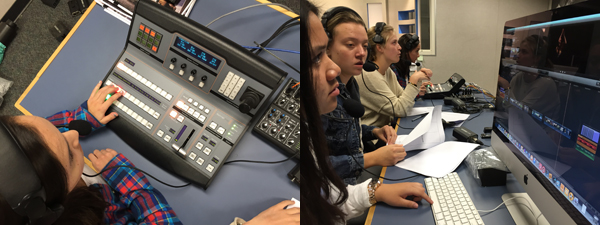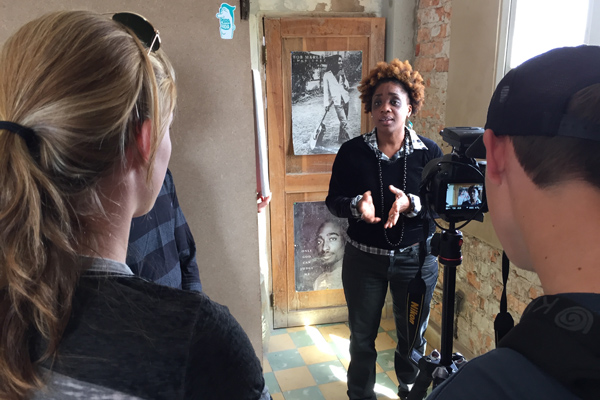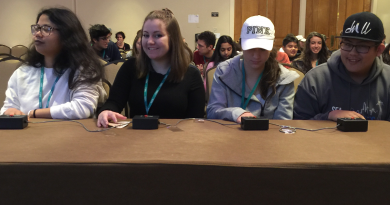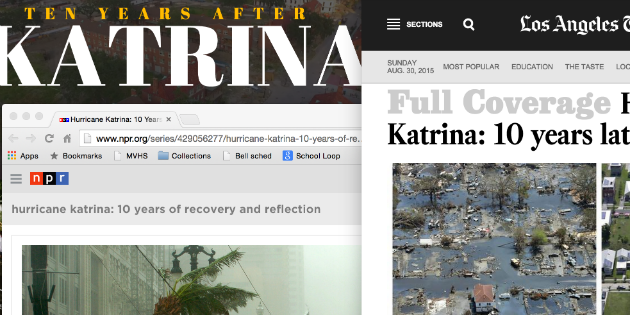Beyond the Lip Dub Factory: Courageous Broadcast Journalists
 Someone once said that bad things happen in the world, but its our job as journalists to help fix them. This kind of reporting takes courage, especially for broadcast journalism students, who are often relegated to airing daily announcements and making lip dub videos to, you know, improve school spirit.
Someone once said that bad things happen in the world, but its our job as journalists to help fix them. This kind of reporting takes courage, especially for broadcast journalism students, who are often relegated to airing daily announcements and making lip dub videos to, you know, improve school spirit.
As advisers, it’s time to challenge ourselves and our students to have some courage and, as I discussed in my initial article as National Broadcast Adviser of the Year, put the ‘journalism’ back in broadcast journalism.
But how can you teach courage? And more importantly in a school setting, how can you create an environment where people are receptive to courageous reporting?
Your double-barreled approach should be to simultaneously train your students, and educate the adults who are reluctant for your staff to take on controversial subject matter.
Develop A Courageous Staff
Ask these essential questions of your staff: If you are not prepared to expose the truth, who will? If you know something bad is happening, isn’t it your responsibility to tell people about it? What happens if you don’t report on something, changes aren’t made, and then someone gets hurt? Are you now responsible for what happens?
Brainstorm a group of topics that no one talks about, but everyone knows is a problem. Why don’t people talk about them?
“What if?” Brainstorm a huge long list of taboo subjects that your school or town doesn’t talk about. These can be the elephants in the room, or big ideas that no one has thought to ask about. My students have developed questions like “What if school started at 9am?” “What if there were no AP classes?” “What if black were white?” “What if everyone spoke the same language?” The key is to not self-edit, and let the ideas flow.
Use real life examples of topics from your school or town as a starting point for conversations about the role of news. If a topic hasn’t been reported, how would our lives, or those involved, be different? In my class, we’ve discussed underage drinking, cheating, concussions in sports, bad administrators, etc. What’s at stake for those involved? Your story literally has the potential to save someone’s life by allowing them to make informed decisions, so why not help them make those decisions?
We’ve got your back. Support each other when the critics rear their heads. Determine what is justified in those concerns, and what is solely a reaction to being uncomfortable? If your staff works hard, is accurate and professional, then you can have confidence in your work to weather any storm.
Develop A Courageous Audience
Its good to equate your program with a school newspaper–one that’s rigorous and professional. To do this, you’ll need to put a stake in the ground.
- Develop your mission statement and code of ethics, share it with the faculty and post it on your website for everyone to see.
- Explain your curricular goals to your administration. Keep it focused on why this approach is best for your students: rigorous writing, critical thinking, and multimedia communication skills. In other words, Common Core standards!
- Establish a track record of professionalism with your staff: accuracy in your stories, diversity of coverage (try to touch all constituencies and stakeholders, and cover the good as well as the bad), produce relevant stories, and ensure technical precision. Your reputation follows you, so it’s important to earn the respect of administration and faculty.
- Engage your audience by encouraging story submissions and use of social media for content distribution as well as feedback.
- Bring parents and other community members into the fold and develop buy-in for your program. They’ll help back you up when you get heat for covering tough stories.
While there is certainly time for lip dubs, and other fun projects, you don’t want to be defined by them. We owe it to society to teach our students to be courageous reporters, and we owe it to our audience to provide an example of professionalism in landscape of cable networks and local newscasts often lacking it. Let’s embrace our role as journalists, elevate the discourse in our communities, and help regain the respect once garnered by Walter Cronkite and Edward R. Murrow.







Pingback:Thursday’s Tips-March 26 | Missouri Interscholastic Press Association
This was my favorite line: “While there is certainly time for lip dubs, and other fun projects, you don’t want to be defined by them.” So on point. Good stuff, Michael.
This article should be mandatory reading for all advisers, regardless of the medium. Inspiring and instructive!